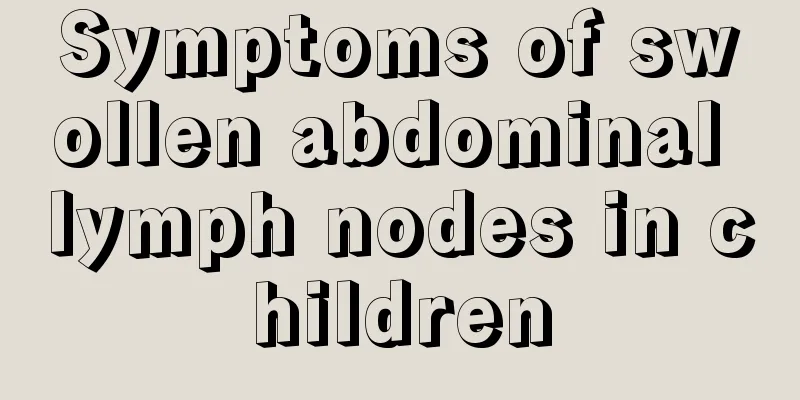Symptoms of swollen abdominal lymph nodes in children

|
Many children have swollen lymph nodes in their abdomen. This disease poses a great threat to children's bodies. Therefore, many parents, when their children have swollen abdominal lymph nodes, want to fully understand the symptoms of swollen abdominal lymph nodes in children. The following is a detailed introduction for many parents, and you can continue to learn about it. Abdominal lymphadenopathy in children is mostly caused by viral infection, which is more common in children under 7 years old in winter and spring. It often occurs during the course of acute upper respiratory tract infection or secondary to intestinal inflammation. Typical symptoms are fever, abdominal pain, vomiting, and sometimes diarrhea or constipation. symptom Typical symptoms include sore throat, fatigue and discomfort after an upper respiratory tract infection, followed by fever, abdominal pain, vomiting, and sometimes diarrhea or constipation. About 20% of children have swollen cervical lymph nodes. Abdominal pain is the earliest symptom of the disease. It can occur in any part of the body, but because the lesion mainly affects a group of lymph nodes in the terminal ileum, it is most common in the right lower abdomen. The nature of the abdominal pain is not fixed and can manifest as dull pain or spasmodic pain. The child feels better between two pains. The most sensitive tenderness site may be different in each physical examination. The tenderness site is close to the midline or higher, not fixed like in acute appendicitis, and is milder than in acute appendicitis, with less rebound pain and abdominal muscle tension. Occasionally, a small nodular mass with tenderness can be palpated in the right lower abdomen, which is an enlarged mesenteric lymph node. Some patients may have intestinal obstruction and should be carefully observed. For younger children who present with clinical symptoms similar to appendicitis but with milder symptoms and no abdominal muscle tension, acute mesenteric lymphadenitis should be considered. Generally, abdominal pain can be significantly improved after fasting, intravenous infusion, antibiotics, etc., and no surgical treatment is required. However, it is sometimes difficult to differentiate it from appendicitis. If symptoms do not improve after treatment and observation, surgical exploration is recommended. Acute mesenteric lymphadenitis should be considered in children with clinical fever, abdominal pain, vomiting and upper respiratory tract infection, or after intestinal inflammation without abdominal muscle tension. Characteristics of the disease: 1. Most of them occur in complications of upper respiratory tract infection or intestinal infection, with clinical manifestations such as fever, abdominal pain, and vomiting. 2. Abdominal pain is most common in the right lower abdomen and is paroxysmal and spasmodic. Rebound pain and abdominal muscle tension are rare. 3. Abdominal tenderness is not fixed and may change with changes in body position. 4. Ultrasound examination showed enlarged mesenteric lymph nodes. 5. The diagnosis of this disease needs to be differentiated from acute abdominal diseases such as acute appendicitis, hyperperistalsis of the intestine, and ascariasis. 6. Children with a good prognosis after anti-inflammatory and antiviral treatment who develop high fever and abdominal pain during upper respiratory tract infection or intestinal infection should be considered to have the possibility of concurrent acute mesenteric lymphadenitis. Early abdominal B-ultrasound examination can clarify the diagnosis, prevent misdiagnosis of the disease, help to correctly deal with the disease, guide treatment, and improve efficacy. This article provides a comprehensive introduction to the symptoms of swollen abdominal lymph nodes in children. Therefore, for many parents, after fully understanding the symptoms of swollen abdominal lymph nodes in children, in order not to delay treatment, they must take their children to a large hospital for a comprehensive examination, confirm the diagnosis, and then use the best current treatment method to help their children recover from this disease as soon as possible. |
<<: When should children receive vaccinations?
>>: What are the reasons for the red scalp of newborns?
Recommend
What is the reason for the baby's excessive sweating?
Many mothers may find that their babies sweat too...
What to do if your child has trouble breathing while sleeping
Some mothers find that their babies breathe very ...
What to do if your child's baby teeth become loose
Loosening of deciduous teeth is a sign that a chi...
How to grow taller if your child is short?
Sometimes when people look at problems, they alwa...
What are the symptoms of tracheitis in children?
Children often have some bronchitis. Inflammation...
Child being tickled
In life, there are many children playing with eac...
Do all newborns breathe very fast?
The breathing of a newborn is indeed faster than ...
What medicine should be sprayed for children's oral ulcers?
Children in their early childhood are very prone ...
The baby fell headfirst to the ground
If a baby falls headfirst, people must pay attent...
Can I get vaccinated if I have tonsillitis?
Tonsils are mainly distributed on both sides of t...
Primary school third grade schedule
The third grade is an important year in elementar...
How to improve children's memory?
Children are in a critical stage of growth. Our m...
What causes my baby to have recurrent oral ulcers?
Oral ulcers are a disease that can occur in all a...
What are the sleeping positions for newborns?
The sleeping posture of a newborn is a particular...
What should I do if my child urinates frequently before bedtime?
Many children will shout that they want to pee be...









